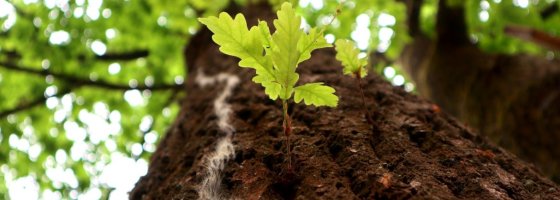Blog post
Public health adaptation to climate change in practice: learning from the oak processionary moth
By Yvette Buist - As climate change continues to make headlines, we are becoming increasingly aware of its impact on our health. From rising temperatures leading to higher risks of skin cancer and heat-related mortality to an increase in hay fever cases, the effects are undeniable. There are also other aspects of concern, such as the emergence of new vector-borne diseases transmitted by insects like mosquitoes and ticks. One example is the Tiger mosquito, known to carry diseases such as dengue and chikungunya.

To address these new health risks brought about by climate change, it is crucial to understand how to develop suitable responses. In this context, my research delves into the case of the Oak Processionary Moth (OPM). The OPM is a moth whose caterpillars predominantly inhabit oak trees and feed on oak leaves. They move in procession-like formations, hence their name. Climate change, reduced biodiversity, and landscape design have allowed the OPM to spread and become a nuisance, causing skin irritations and eye problems due to its stinging hairs. While the OPM will likely never vanish from the Netherlands, we can reduce the impact through specific adaptation strategies – what I call public health adaptation.
Public health adaptation involves designing, implementing, monitoring, and evaluating strategies to adapt to the health effects of climate change. However, this process is complex, including different stakeholders with varying perceptions of risks and responsibilities. Additionally, uncertainties, such as the pace of climate change and its impact on health systems, further complicate the development of adaptation strategies. There is no one-size-fits-all approach to adaptation. For example, within densely populated areas, methods such as manual removal of the OPM might be preferable, whereas in sparsely populated areas, adaptation can be directed towards enhancing biodiversity to attract predators in the longer term. Therefore, stakeholders need to learn and collaborate to arrive at suitable adaptation strategies. I use social learning theory to understand how stakeholders developed new ideas, built relationships, and take action to develop these adaptation strategies.
One of my studies is focused on how the Netherlands adapts to the OPM. In 2019, there was a major OPM outbreak and in response a knowledge platform was established to reduce and prevent the negative effects of OPM. A wide range of stakeholders is involved in the platform, such as representatives from various national, provincial, and local authorities, medical environmental health specialists, biologists, and researchers. I examined how processes of social learning played out in this knowledge platform. Building relationships and collaboration with various parties proved instrumental in developing and implementing adaptation strategies. For example, the platform received questions about OPM adaptation strategies. To formulate answers, the platform group collaborated with a wide range of experts, including biologists, the Butterfly Conservation, developers of OPM control methods, and environmental health experts. These experts provided knowledge from their respective fields of expertise. Together, they developed information sheets about common, promising, and less promising OPM adaptation strategies for reducing the nuisance caused by the caterpillars.
Nevertheless, due to the uncertainties surrounding OPM and adaptation strategies, ongoing discussions were needed to address the evolving situation. Ideas for the future organization of OPM adaption evolved gradually and required time, flexibility, and commitment. The case of the OPM highlights the importance of building relationships among stakeholders and taking incremental steps in the learning process to develop public health adaptation strategies. By working together and being adaptable, we could build resilience to the challenges posed by climate change, such as the OPM, heat stress, and vector born diseases. As we continue to face climate-related health challenges, it is crucial to learn from such cases and apply these lessons to safeguard our well-being.
Further reading:
- Understanding climate health adaptation in practice: adaptation to the oak processionary moth in The Netherlands, 2021, Y Buist , M Bekker , L Vaandrager , M Koelen. https://doi.org/10.3390/ijerph18063080
- Strategies for public health adaptation to climate change in practice: social learning in the processionary Moth Knowledge Platform, 2023, Y Buist , M Bekker , L Vaandrager , M Koelen, B. van Mierlo. https://doi.org/10.3389/fpubh.2023.1179129
Yvette Buist is PhD researcher at Wageningen University & Research, chair group Health & Society. She is interested in studying the interaction between health and environment and thereby looking at health from a broad perspective, taking into account characteristic such as social participation, meaningfulness, wellbeing and organization. Currently she is doing her PhD in which she focusses on climate change, public health adaptation, prevention, social learning and the oak processionary moth. She investigates how social learning contributes to oak processionary moth control and the development of public health adaptation.